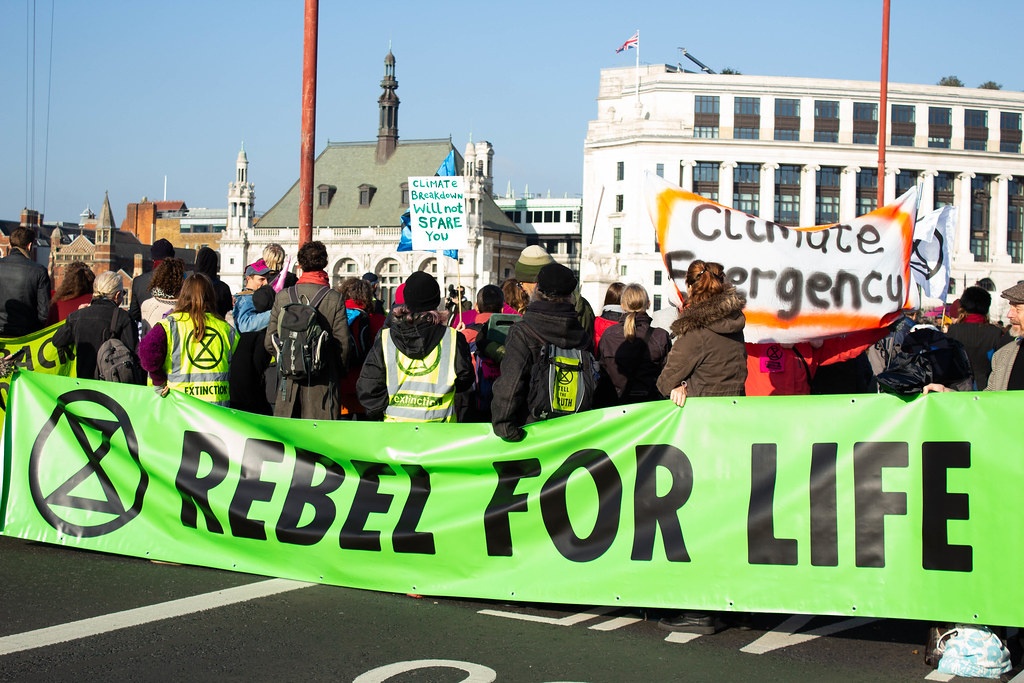Uncooperative crusties” and “importunate nose-ringed climate protesters” must abandon their “hemp-smelling bivouacs,” PM Boris Johnson has demanded. Johnson turned to dated stereotypes that surround protesters when commenting on Extinction Rebellion’s worldwide demonstrations, exacerbating the already fractured relationship between the system and the people. Only three days into the two-week long-planned demonstration period, nearly six-hundred people had been arrested in London.
Extinction Rebellion’s protests are not reflective of a lack of understanding, on the current regime’s part, of the youth generation. However, they are reflective of the public’s loss of trust in the government. Greta Thunberg may be a figurehead for fighting climate change and challenging systems that are failing to tackle it, but this is not restricted to a youth movement. It is a movement by and for all people and they are demanding one thing: for the government to tell the truth.
Historically, protests and mass demonstrations have been associated with youth culture. Taking a look at the Guardian’s ‘Extinction Rebellion: the arrestables – a photo essay’ will tell you that the current climate crisis revolution involves people of all generations. The intimate portraits reveal the identities of those who have been arrested for Extinction Rebellion’s cause. The individuals include retired academic librarians, retired probation officers, retired veterinary epidemiologists, retired teachers and retired lawyers. I’m sure you have spotted the common thread that links these climate activist rebels together: they are retirees.
Extinction Rebellion discourages arrestees from taking bail because once they leave a cell they clear space for another rebel to be chucked in. Filling up the cells is the goal; protect your fellow rebels. Sur Parfitt, a seventy-seven-year-old arrested rebel, noted that the older generations need to use their privilege to “offer ourselves as arrestables and be on the frontline. We get our pensions and have no jobs or careers to worry about.”
Some critics of Extinction Rebellion have gone straight for Greta Thunberg, the sixteen-year-old figurehead who has aided tremendously in building an unshakeable momentum behind the fight against climate change. Yes, she comes from a position of privilege, but she is using her platform to educate the masses on the current climate emergency. Perhaps it is her age which is hindering her from being taken seriously, or maybe Jeremy Clarkson was just having an off day when he called her a “spoilt brat” and told her to “be a good girl” and “shut up.”
One possible reason for the anti-climate change movement being labelled as belonging to the ‘youth’ could be because they are the ones who are more active in the social media broadcasting of the demonstrations. However, attending just one demonstration will tell you otherwise: parents, teachers, and grandparents are just as concerned. They are the ones getting arrested for the cause. They are the ones fighting for the youth’s future. They are trying to counteract the doings of their generation. Greta has inspired her peers, primary school-aged children, adults, parents and those of all ages above and between. Understandably, younger generations may feel more passionate, and in many cases angry, because it is their future which is in jeopardy.
Viewing Extinction Rebellion’s protests as simply reflecting a discrepancy between the current regime and youth generation is not good enough. Older generations are just as invested in the cause. Yes, there could be more members of older generations at the protests, but there could be more youths as well.
Climate change does not care about borders; your age; if your nose is pierced, if you smell of hemp, or if you are a city banker. Inward thinking and a failure to see the fragility of our world’s ecology is not an option.
Annabel Martin
Image: Flickr.

